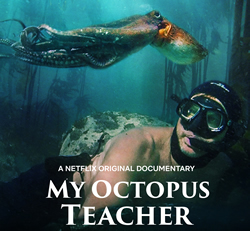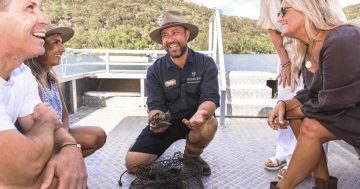Reviewed by Rama Gaind.
Directors: Pippa Ehrlich and James Reed, Netflix.
 An uplifting story of a friendship between a human and an octopus – My Octopus Teacher – won the Oscar for Best Documentary at the 93rd Academy Awards last month.
An uplifting story of a friendship between a human and an octopus – My Octopus Teacher – won the Oscar for Best Documentary at the 93rd Academy Awards last month.
It’s “observational storytelling” at its best as a diver swims with an eight-limbed mollusc that lives in a kelp forest off the Western Cape of South Africa. A creature of great, shimmery beauty and mystery, it’s regarded by many with bemusement more than affection.
Ehrlich and Reed deliver an appealing, a tremendously crowd-pleasing documentary that goes out of its way to humanise these amorphous aliens of the sea: through standard anthropomorphic techniques and the compassionate presence of its producer-narrator, South African filmmaker and conservationist Craig Foster.
Foster’s unexpected kinship with a single octopus, encountered while diving in the richly populated underwater forest gives this simply framed documentary its storyline push and stirring lift.
At the outset, as he talks to viewers through a period of professional burnout he experienced some years ago, spurring a renewed urge to connect with the natural world. As Foster tells it, free diving in the local sea forest near his Cape Town home provided the therapeutic balm he was looking for; a surprising soul connection with a spirited octopus was an unplanned bonus as it helped him connect more deeply with his own humanity.
We learn how the experience of spending time in nature, and specifically with the octopus, changes him. He does a good job of highlighting the complex intelligence of octopus, and it’s fascinating to learn that they are so short-lived.
Foster discovers that the octopus has mated, but this isn’t entirely good news. It’s a sign that the end is near: octopuses are semelparous animals, which means the females die after they reproduce. Foster watches her waste away as her eggs hatch.
What is also fascinating is learning about how kelp forests are a unique habitat that provide food for marine life and shelter through some of the roughest storms. Hidden under the ocean surface, kelp forests play an important role in preserving the health of the oceans through photosynthesis, and purify surrounding water by removing waste produced by its inhabitants.
In his book Sea Change, Craig Foster refers to it as a ‘three-dimensional liquid forest or golden forest where one can float amongst the high canopy, jump off the top and fly down to the forest floor’.
An eye-opening underwater spectacular … it’s hard not to be won over!











